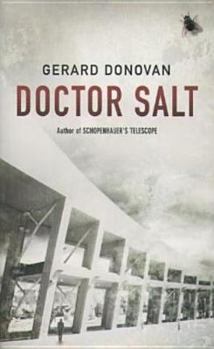Doctor Salt
Select Format
Select Condition 
Book Overview
A shockingly familiar, dystopian vision of a world where health comes at the very highest price, from the Booker longlisted author of Schopenhauer's Telescope. This description may be from another edition of this product.
Format:Hardcover
Language:English
ISBN:0743263588
ISBN13:9780743263580
Release Date:January 2005
Publisher:Simon & Schuster
Length:263 Pages
Customer Reviews
1 rating
"Life is indeed a very long illness"
Published by Thriftbooks.com User , 16 years ago
Burial, revenge, sudden death, mourning, and reversal of fortune: these themes continue in Donovan's third novel, following (also reviewed by me) "Schopenhauer's Telescope" & "Julius Winsome." The narrator this time, however, lacks the erudition of the teacher in the first and the Shakespearean stylist of the second, and the story takes on more a tone shifting from Salinger's distanced irony to Kafka-tinged doom to DeLillo's cool evocation of national threat to George Saunders' edgy satire of self-actualization groupthink. It takes place about two decades from now, after terrorist threats relentlessly publicized by the media, and sponsored by drug firms, reduce Americans to a state of government and corporate-fueled constant uneasiness. Direct selling of drugs in coffee groups, book clubs, or like Avon, will occur. "Medication is a companion for life, and life is a very long illness." Pharmaceutical firms manufacture "lifestyle diseases" like anxiety and stress disorders and then sell us the pills to remedy these made-up, generalized "disorders" that are as common as feeling nervous, forgetful, shy, or angry. "Medicine is the new food." Not for when we feel pain, but to avoid pain. A pre-emptive strike on the ancient hypothalamus and amygdala, the centers of fear and danger reaction, that pills will shut down permanently. It was based on the Irish-born, New York-based author (who told us this when he read from "Julius" at a conference in Oregon) overhearing teens talk about all the meds they were on for ADD and the like. I think he said the book would be called "Doctor Salt," and this title would have also worked into the desolate exurban Utah setting as well, but "Sunless," which the narrator adapts as his own name, takes on metaphorical richness in the story's closing moments. Such passages reveal Donovan's earlier career as a poet, and while the plot (more than his earlier novels) rambles and wanders perhaps with too much verisimilitude to express the narrator's own sorrows, drug-induced or brought on by family losses, the story does perk up just in time, halfway in, when the narrator takes an offer to test medications for Pharmalak. The motivational seminar, the psychobabble couching profit within comfort peddled in a pill, and a near-future in which pills coded by terror levels can be conceived to "cure" an endless array of disorders that promise: "no one has to feel bad anymore." This is the convincing message that underlies this disturbing, yet often shimmering, novel. The characters, outside of his family as they succumb to a future when one's cause of death can be "lack of health insurance," often lack specificity. This may be intentional, for much of the story roams more in reveries than in reality. Yet, it risks, after many pages of eloquent yet dispiriting prose, to make you the reader feel as ill at ease as the patients themselves. So, this may not be a perky tale for the depressed. This, however, remains the moral of a novel





